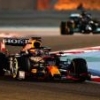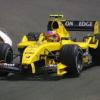Hey folks. Can't say i'm good at starting threats with a wall of text, so i'll just go to the point.
What is the learning curve for most F1 drivers? Here i'm talking mostly about the first couple of years, but feel free to expand on to whole careers. Just how much time does it take for a F1 driver to reach his, more or less, peak? I can't really say that i've seen drivers to get better at it after their 2nd or 3rd year, for some a single year is enough and then they perform in the more or less same level (speed and consistency wise). I mean, F1 ain't their first year in racing as most drivers have been in this since they were little (kart racing, junior formulas etc.) so often we seen driving styles, attitudes and performance overal not changing.
The whole question rises from many people saying about some drivers that they haven't stepped up yet, or that they are still young and they'll get even better and so on.
Would like people to state examples that they recall, of drivers in this sports history that had a longer period of improvement with the end result being a noticeably better driver, or just state your opinions on this matter overall.
Discuss.
Edited by Okyo, 18 April 2016 - 18:40.





















